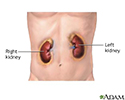Alkalosis
Alkalosis is a condition in which the body fluids have excess base (alkali). This is the opposite of excess acid (acidosis).
Acidosis
Acidosis is a condition in which there is too much acid in the body fluids. It is the opposite of alkalosis (a condition in which there is too much ...

Causes
The kidneys and lungs maintain the proper balance (proper pH level) of chemicals called acids and bases in the body. Decreased carbon dioxide (an acid) level or increased bicarbonate (a base) level makes the body too alkaline, a condition called alkalosis. There are different types of alkalosis. These are described below.
Respiratory alkalosis is caused by a low carbon dioxide level in the blood. This can be due to:
Respiratory alkalosis
Respiratory alkalosis is a condition marked by a low level of carbon dioxide in the blood due to breathing excessively.

- Fever
- Being at a high altitude
- Lack of oxygen
- Liver disease
- Lung disease, which causes you to breathe faster (hyperventilate)
Hyperventilate
Hyperventilation is rapid and deep breathing. It is also called overbreathing, and it may leave you feeling breathless.
 ImageRead Article Now Book Mark Article
ImageRead Article Now Book Mark Article - Aspirin poisoning
Aspirin poisoning
Aspirin is a nonsteroidal anti-inflammatory drug (NSAID) used to relieve mild to moderate aches and pains, swelling, and fever. Aspirin overdose occu...
Read Article Now Book Mark Article
Metabolic alkalosis is caused by too much bicarbonate in the blood. It can also occur due to certain kidney diseases.
Hypochloremic alkalosis is caused by an extreme lack or loss of chloride, such as from prolonged vomiting.
Hypokalemic alkalosis is caused by the kidneys' response to an extreme lack or loss of potassium. This can occur from taking certain water pills (diuretics).
Compensated alkalosis occurs when the body returns the acid-base balance to near normal in cases of alkalosis, but bicarbonate and carbon dioxide levels remain abnormal.
Symptoms
Symptoms of alkalosis can include any of the following:
- Confusion (can progress to stupor or coma)
Confusion
Confusion is the inability to think as clearly or quickly as you normally do. You may feel disoriented and have difficulty paying attention, remembe...
 ImageRead Article Now Book Mark Article
ImageRead Article Now Book Mark Article - Hand tremor
- Lightheadedness
- Muscle twitching
- Nausea, vomiting
- Numbness or tingling in the face, hands, or feet
- Prolonged muscle spasms (tetany)
Muscle spasms
Muscle cramps are when a muscle gets tight (contracts) without you trying to tighten it, and it does not relax. Cramps may involve all or part of on...
 ImageRead Article Now Book Mark Article
ImageRead Article Now Book Mark Article
Exams and Tests
Your health care provider will perform a physical exam and ask about your symptoms.
Laboratory tests that may be ordered include:
- Arterial or venous blood gas analysis.
Arterial or venous blood gas analysis
Blood gases are a measurement of how much oxygen and carbon dioxide are in your blood. They also determine the acidity (pH) of your blood.
 ImageRead Article Now Book Mark Article
ImageRead Article Now Book Mark Article - Electrolytes test, such as basic metabolic panel to confirm alkalosis and show whether it is respiratory or metabolic alkalosis.
Basic metabolic panel
The basic metabolic panel is a group of blood tests that provides information about your body's metabolism.
 ImageRead Article Now Book Mark Article
ImageRead Article Now Book Mark Article
Other blood tests may be needed to determine the cause of the alkalosis.
Other tests may be needed to determine the cause of the alkalosis. These may include:
- Chest x-ray
- Urinalysis
Urinalysis
Urinalysis is the physical, chemical, and microscopic examination of urine. It involves a number of tests to detect and measure various compounds th...
 ImageRead Article Now Book Mark Article
ImageRead Article Now Book Mark Article - Urine pH
Treatment
To treat alkalosis, your provider needs to first find the underlying cause.
For alkalosis caused by hyperventilation, breathing into a paper bag allows you to keep more carbon dioxide in your body, which improves the alkalosis. If your oxygen level is low, you may receive oxygen.
Medicines may be needed to correct chemical loss (such as chloride and potassium). Your provider will monitor your vital signs (temperature, pulse, rate of breathing, and blood pressure).
Vital signs
Vital signs reflect essential body functions, including your heartbeat rate, breathing rate, temperature, and blood pressure. Your health care provi...

Outlook (Prognosis)
Most cases of alkalosis respond well to treatment.
Possible Complications
Untreated or not treated properly, complications may include any of the following:
- Arrhythmias (heart beating too fast, too slow, or irregularly)
Arrhythmias
An arrhythmia is a disorder of the heart rate (pulse) or heart rhythm. The heart can beat too fast (tachycardia), too slow (bradycardia), or irregul...
 ImageRead Article Now Book Mark Article
ImageRead Article Now Book Mark Article - Coma
- Electrolyte imbalance (such as low potassium level)
Electrolyte
Electrolytes are minerals in your blood and other body fluids that carry an electric charge. Electrolytes affect how your body functions in many ways...
Read Article Now Book Mark ArticleLow potassium level
Low blood potassium level is a condition in which the amount of potassium in the blood is lower than normal. The medical name of this condition is h...
 ImageRead Article Now Book Mark Article
ImageRead Article Now Book Mark Article
When to Contact a Medical Professional
Contact your provider if you become confused, unable to concentrate, or unable to "catch your breath."
Go to the emergency room or call 911 or the local emergency number if there is:
- Loss of consciousness
- Rapidly worsening symptoms of alkalosis
- Seizures
Seizures
A seizure is the physical changes in behavior that occurs during an episode of specific types of abnormal electrical activity in the brain. The term ...
 ImageRead Article Now Book Mark Article
ImageRead Article Now Book Mark Article - Severe breathing difficulties
Prevention
Prevention depends on the cause of the alkalosis. People with healthy kidneys and lungs do not usually have serious alkalosis.
References
Oh MS, Briefel G, Pincus MR. Evaluation of renal function, water, electrolytes, and acid-base balance. In: McPherson RA, Pincus MR, eds. Henry's Clinical Diagnosis and Management by Laboratory Methods. 24th ed. Philadelphia, PA: Elsevier; 2022:chap 15.
Sanghavi S, Albert TJ, Swenson ER. Acid-base balance. In: Broaddus VC, Ernst JD, King TE, et al, eds. Murray and Nadel's Textbook of Respiratory Medicine. 7th ed. Philadelphia, PA: Elsevier; 2022:chap 12.
Seifter JL. Acid-base disorders. In: Goldman L, Cooney KA, eds. Goldman-Cecil Medicine. 27th ed. Philadelphia, PA: Elsevier; 2024:chap 104.
Review Date: 11/19/2023
Reviewed By: Jacob Berman, MD, MPH, Clinical Assistant Professor of Medicine, Division of General Internal Medicine, University of Washington School of Medicine, Seattle, WA. Also reviewed by David C. Dugdale, MD, Medical Director, Brenda Conaway, Editorial Director, and the A.D.A.M. Editorial team.


